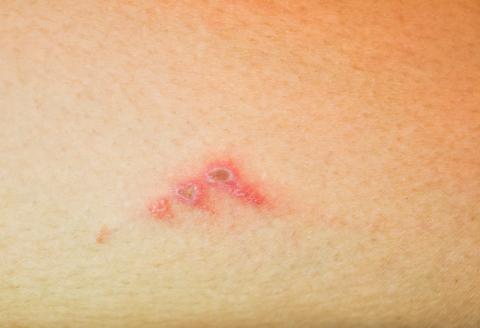Impetigo
Impetigo is a common and very contagious skin infection caused by staphylococcal or streptococcal bacteria. It is most commonly caused by the bacterium Streptococcus pyogenes, also known as group A strep.
The most common type of impetigo, called non-bullous impetigo, occurs around the nose and mouth.
A less common type, called bullous impetigo, occurs on the trunk of infants and young children. Bullous impetigo may cause larger blisters than the non-bullous form.
A more serious type of impetigo, called ecthyma, goes deeper into the skin and can cause painful sores full of fluid or pus that turn into deep ulcers.
Impetigo 101
Impetigo is spread through skin-to-skin contact with an infected person, or contact with an item the infected person has touched.
- Impetigo is most common in places where there is close person-to-person contact.
- Sores caused by impetigo are very contagious. The infection can spread quickly in day cares, schools, sports teams, and military training facilities.
- The infection is most common in children between the ages of 2 to 6 years old.
- Impetigo is common in teens involved in contact sports. Wrestling is the most commonly reported sport.
- A person who has impetigo can spread it to others until they have had proper antibiotic treatment for at least 24 hours. It is important to keep your child home from school or day care until they are no longer contagious.
Signs and symptoms show up within 10 days after contact with the bacteria
- Impetigo starts as a few small blisters that get bigger and split open within 24 hours.
- The blisters are usually found on the face around the nose and mouth, but can appear anywhere on the body.
- Yellow liquid containing bacteria drains from the blisters after they burst.
- The liquid dries after a few days and forms a honey-colored crust.
The treatment for impetigo is antibiotic.
People can take a pill or apply antibiotic cream to the areas of the skin where the infection is present.
A person with impetigo can no longer spread the infection to others after they have been appropriately treated for 24 hours.
Impetigo can be prevented by keeping skin clean
It is important to always wash cuts, scrapes, insect bites, and other wounds right away. To prevent spreading impetigo to others:
- Wash the areas with the skin infection with mild soap and water and cover with a clean bandage or gauze.
- Wash the clothes, towels, and toys of an infected person. Do not share these items.
- Wear gloves when applying antibiotic cream. Wash your hands well before and after applying.
- Cut the nails of an infected child to stop them from scratching the sores.
- Wash hands frequently, P-01710.
- Keep your child home until they are no longer contagious.
- Impetigo fact sheet, P-42062 (Multiple Languages): Educational fact sheet for the general public on impetigo covering signs and symptoms, treatment, and prevention.
- Group A Streptococcal (GAS) Infections: The CDC (Centers for Disease Control and Prevention) webpage on infections caused by GAS.
- Wall Chart for Childhood Diseases in Group Settings, P-44397 (PDF): Exclusion criteria and communicable disease wall chart for childhood diseases in group settings.
- Wash Your Hands! P-01710: The Department of Health Services flyer with information on proper handwashing techniques.
Questions about impetigo? Contact us.
Phone: 608-267-9003 | Fax: 608-261-4976

